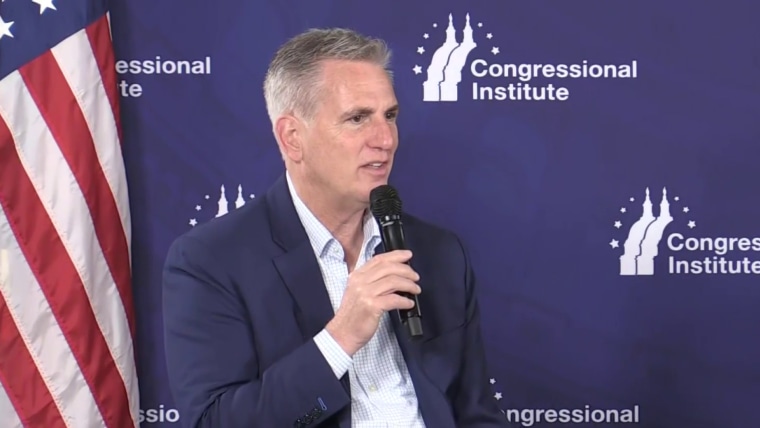Just a few hours after Donald Trump saw some media reports and predicted his arrest, House Speaker Kevin McCarthy went to work on the former president’s behalf. The California Republican not only scrambled to defend Trump, the speaker also lashed out at the Manhattan District Attorney’s Office and directed House committee chairs to investigate the work of the local prosecutor. (The chairs complied yesterday.)
But McCarthy has also responded to the hush money scandal by pointing to an ostensibly principled position about the justice system in general.
Donald Trump investigations: Follow our live blog for the latest updates and expert analysis on potential indictments.
“We’re not coming here to defend President Trump, we’re coming to defend equal justice,” the GOP leader told reporters this morning. After complaining about — who else? — Hillary Clinton and a campaign finance fine from the 2016 cycle, McCarthy again said: “We live in America and it should be equal justice.”
The House speaker pushed a similar line on Twitter yesterday:
“It doesn’t matter if it’s President Trump or a Democrat. Our justice system should not be used to target political opponents. Period.”
On the surface, none of what the Republican leader said seemed especially controversial. The number of prominent political voices willing to champion unequal justice is quite small. The same is true of those who espouse turning the criminal justice system into a political weapon.
But just below the surface, McCarthy’s comments lead to some unavoidable follow-up questions.
1. Where was he in the Trump era? Donald Trump didn’t even try to hide his efforts to use the justice system to target his political opponents. As president, he literally published tweets in the hopes of lobbying prosecutors to go after his perceived foes in the hopes of advancing his political interests. Trump’s own White House chief of staff freely admitted, on the record, that Trump repeatedly tried to use the Justice Department to go after those who’d wronged him in some way.
McCarthy never said a word about any of this, and he has never explained why not.
2. What happens if there’s evidence of wrongdoing? Our justice system shouldn’t be used to “target” political opponents, but there is no politician exception to the rule of law. In fact, all kinds of American politicians — including current and former officeholders — have faced charges of varying degrees of seriousness in recent years.
Were they all “targeted” as part of some kind of partisan crusade? Of course not. Prosecutors had evidence of wrongdoing, so they filed charges and took the issues to court.
By all appearances, federal and state prosecutors are now weighing the possibility of cases against a former U.S. president — which, to hear McCarthy tell it, is necessarily evidence of political wrongdoing on the part of law enforcement. But what would the House speaker have these officials do? If they have evidence of possible wrongdoing, would the Republican leader have them put that evidence aside simply because of Trump’s political influence?
How would that constitute “equal justice”?

